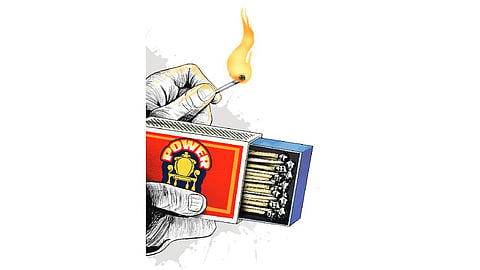

MANGALURU: On July 20, 2022, Masood B, an 18-year-old daily wager, was assaulted by a gang of eight at Kalinja in Sullia taluk of Dakshina Kannada district over a trivial issue and he succumbed a day later in the hospital. Six days later, on the night of July 26, about 40 km away in Bellare, BJP Yuva Morcha leader Praveen Nettaru was murdered by bike-borne assailants. Two days later on July 28, Mohammed Fazil was hacked to death in Katipalla near Mangaluru in tit-for-tat murders.
The victims of these three killings that took place in just nine days neither knew each other nor had anything in common. But all the three murders had a common thread - revenge - which runs deep in coastal Karnataka and is promptly fuelled by religious fanaticism and hate.
While Praveen was murdered in retaliation of Masood’s killing to trigger fear among people as part of now banned PFI’s agenda, Fazil — who had no criminal antecedents — was picked randomly and just because of his religious identity to avenge Praveen’s murder.
There was a lull for almost three years and when everyone thought that Dakshina Kannada had moved on, came the brutal murder of Hindutva activist and rowdy-sheeter Suhas Shetty, who was the main accused in Fazil’s murder.
There seems to be no end to this bitter cycle of murders which is not seen anywhere else in Karnataka.
There are several factors that have contributed to this shocking reality. While in most parts of the state, the minorities hardly resist the majority because of their thin population and lack of money and political power, here the minorities are significantly high in numbers and also are well off and quickly resist any such attempts.
“The majority expects them to be submissive like in other parts which does not happen here simply because of muscle, money and political power. Also, many are not able to digest the economic development of Muslims which has resulted in sullying the community’s image with allegations of ‘Land Jihad’ etc. These issues have also led to severe radicalisation of a section of the community, gravitating them towards organisations like PFI,” said a university professor.
Such communal and revenge killings satiate power hungry parties, which see murders as an opportunity to further their political agenda to achieve power, he adds.
The better economic situation of the region, in a way, has also helped in the radicalisation of youth from both sides. This is further aggravated by politicians who see such murders from the prism of religion, make provocative speeches to polarise the masses and show clear bias in extending compensation and other state benefits.
In the case of Praveen Nettaru, the then BJP government announced a compensation and handed over the probe to NIA, but similar action was not taken with the murders of Masood and Fazil, making the minorities feel alienated. Successive governments don’t seem to be interested in putting an end to the trend.
Sometime ago, the present Congress government announced an Anti-Communal Task Force in the region to rein in communal forces, but that did not see the light of day. After the recent murder, the government has announced similar plans again. The conviction rate in such cases being abysmally low has also failed to deter youth from indulging in such heinous crimes.